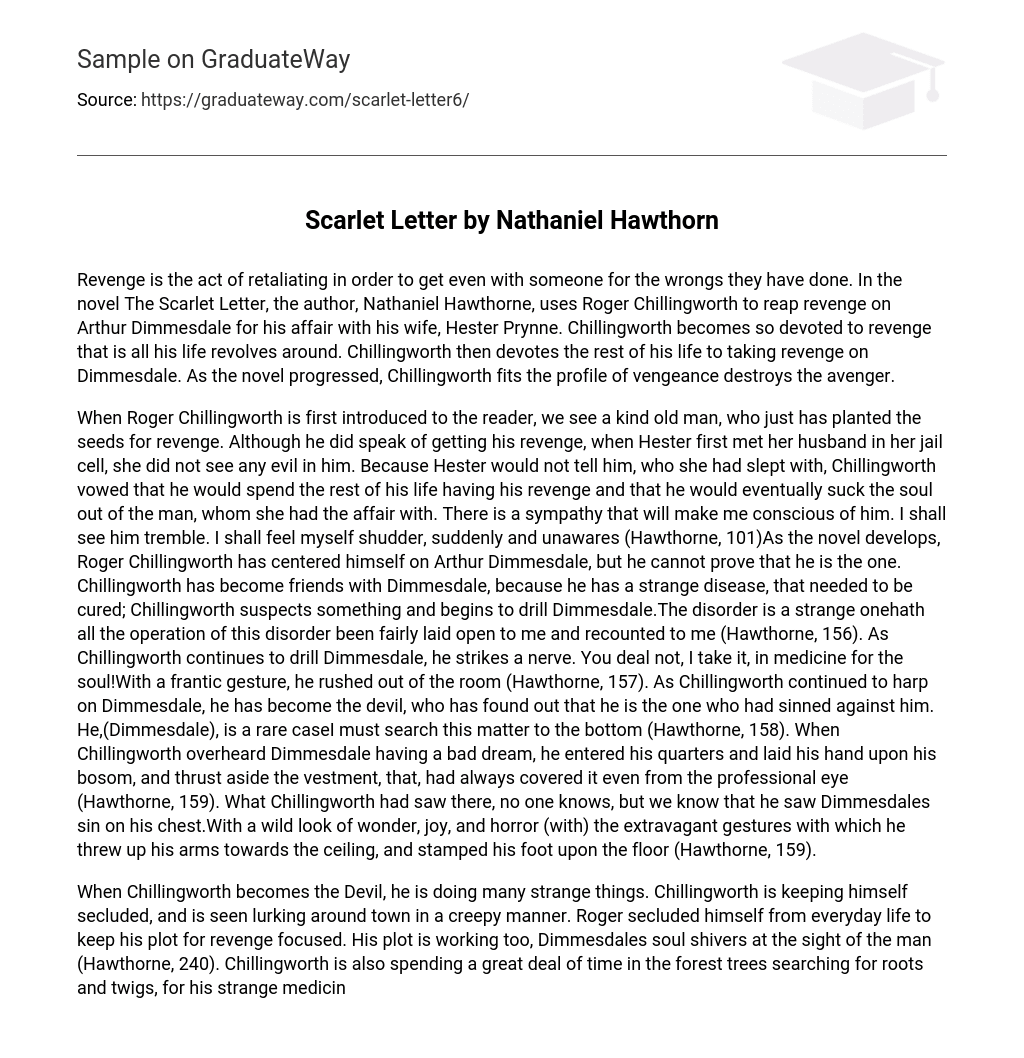Revenge is the act of seeking retribution against someone for their wrongdoing. In Nathaniel Hawthorne’s novel The Scarlet Letter, Roger Chillingworth is driven by a desire to retaliate against Arthur Dimmesdale for his betrayal with Hester Prynne, Chillingworth’s wife. Consumed by his thirst for revenge, Chillingworth’s life becomes entirely centered around his vengeful mission. Throughout the novel, Chillingworth embodies the destructive nature of vengeance.
When introduced, Roger Chillingworth appears as a kind old man who has planted the seeds of revenge. Hester does not initially see any evil in her husband, despite his desire for revenge. Chillingworth vows to spend his life seeking revenge and extracting the soul of Hester’s illicit lover. He anticipates feeling sympathy and satisfaction when he sees this man tremble and shudder. As the novel progresses, Chillingworth becomes fixated on Arthur Dimmesdale but cannot prove his guilt. He befriends Dimmesdale under the guise of treating his mysterious illness but suspects something is amiss. Chillingworth continues to interrogate and provoke Dimmesdale, causing him to react with frustration and flee the room. In his relentless pursuit, Chillingworth transforms into a devilish figure who discovers Dimmesdale’s sin. He considers Dimmesdale to be an exceptional case and resolves to delve deeper into the matter.When Chillingworth heard Dimmesdale having a disturbing dream, he entered his quarters and placed his hand on his chest, and moved aside the garment that had always concealed it from others (Hawthorne, 159). Though what Chillingworth saw there remains unknown, we do know that he witnessed Dimmesdale’s sin on his chest. He had a wild expression of astonishment, delight, and terror, accompanied by exaggerated movements as he raised his arms towards the ceiling and stomped his foot on the floor (Hawthorne, 159).
When Chillingworth transforms into the Devil, he engages in numerous peculiar behaviors. He isolates himself and is observed lurking ominously in the town. Roger secludes himself from society to maintain his single-minded focus on seeking revenge. His plan succeeds, as Dimmesdale is deeply disturbed by his presence (Hawthorne, 240). Additionally, Chillingworth spends a significant amount of time scouring the forest for roots and twigs to use in his peculiar medicines (Hawthorne, 145).
The townspeople perceive Roger Chillingworth as completely evil. When they first encounter him, they believe he is a benevolent elderly doctor who would never harm anyone. Initially, his countenance displayed a contemplative and knowledgeable appearance (Hawthorne, 149). However, as Chillingworth carries out his plan for revenge, the public’s perception of him changes. They now see something repulsive and sinister in his face that they had not previously noticed. This repulsiveness becomes more apparent the more they gaze upon him. According to common belief, the fire in his laboratory originated from hell and was fueled by his internal torment. Consequently, his visage became covered in soot from the accompanying smoke.
Hester Prynne, the wife of Roger Chillingworth, notices a change in him – he is no longer the man she once knew. He has become like a fiend. She sees a red glare in his eyes, as if his soul is burning and on fire inside. Hester confronts him about this transformation and asks if he can rid himself of the hatred that has turned him into a fiend and return to being human. Chillingworth admits to his fiendish nature and declares that he has embraced this role. He accepts his fate and tells Hester to do whatever she wants with the man they discussed.
Chillingworth’s revenge plan revolves around Dimmesdale’s failure to confess his crime. During Election Day, when Dimmesdale finally confessed to the crowd, Chillingworth desperately pleaded with him to keep silent. Old Roger Chillingworth knelt down beside him, his face expressionless and lifeless. He repeated more than once, “Thou hast escaped me, thou hast escaped me!” (Hawthorne, 268). After Dimmesdale confessed and died, Chillingworth found himself with nothing left to live for. Within a year, old Roger Chillingworth’s decline occurred (Hawthorne, 272). Revenge ultimately consumes the avenger, exemplified in the life of Roger Chillingworth. He dedicated his entire existence to seeking revenge, yet what joy did he have to show for it? If Chillingworth had not been so consumed by jealousy, he might have led a more fulfilling life.
Bibliography:





